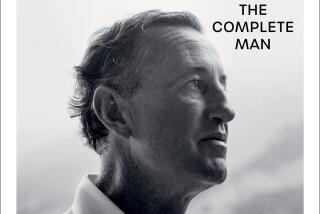Nicolas Freeling, 76; Ex-Cook Wrote Mysteries With European Settings
- Share via
Nicolas Freeling, the London-born crime novelist best known for his mysteries featuring Dutch police inspector Piet Van der Valk, has died. He was 76.
Freeling, who also wrote a popular series of mysteries featuring French detective Henri Castang, died Sunday after a long battle with cancer at his home in Mutzig, in the Vosges region of eastern France.
Described this week in the Guardian of London as “the most thoroughly European of British crime writers,” Freeling was known for expressing what one critic called “heart and unfailing intelligence” in his writing. Another critic, in a 1979 review in Newsweek, wrote that Freeling “has given the detective story new dimensions much as John Le Carre has done for the spy novel.”
The cosmopolitan Freeling, who lived much of his life in France, had spent more than a decade working as a cook in post-World War II French and British luxury seaside hotels before his first book, “Love in Amsterdam,” was published in England in 1961 and in the United States the following year.
A brief stint in jail in 1959 had inspired him to begin writing the novel, the first of 13 international bestsellers featuring Van der Valk, the Amsterdam detective.
Freeling’s crime? He had stolen meat from the hotel kitchen where he worked for his Dutch wife Renee’s supper. During his three weeks in an Amsterdam jail -- as a foreigner, he was suspected of being involved with the city’s underworld -- he was interrogated by a cynical detective, who became the model for Van der Valk.
Freeling began writing “Love in Amsterdam” on pieces of paper he salvaged from his prison job wrapping soap. He finished writing it in Britain after he and his wife were deported.
In the wake of the critical acclaim for “Love in Amsterdam,” Freeling moved back to Amsterdam, where he began turning out one and sometimes two Van der Valk crime novels a year.
Writing in the National Review, John R. Coyne Jr. described Van der Valk as “a cranky, gentle, bumbling, brilliant, nonconformist student of human behavior whose primary concern is why rather than how crimes are committed.”
Tom Sharpe, writing in the New Statesman, deemed Van der Valk “one of the most interesting fictional sleuths to appear in the ‘60s.”
In 1964, Freeling won the British Crime Writers Assn.’s Gold Dagger Award and the French Grand Prix du Roman Policier, and two years later he won an Edgar Allan Poe Award from the Mystery Writers of America.
Freeling’s Van der Valk novels formed the basis of a popular British television series in the 1970s starring the late Barry Foster. The program was revived as seven two-hour specials in the early 1990s.
But in 1972, Freeling, who had moved his family to France, did the unthinkable: Tired of Van der Valk, he killed him part way through “Aupres de ma blonde” and had the detective’s French wife, Arlette, take over for the remainder of the book. Arlette resurfaced as the main protagonist in Freeling’s 1979 crime novel “The Widow.”
Although he disappointed many fans by doing away with Van der Valk, Freeling created a new protagonist: Castang, the thoughtful, Brussels-based French police inspector, who debuted in 1974 in “A Dressing of Diamond” and appeared in 15 more crime novels.
Freeling wrote about 40 books, four of which were nonfiction. As a novelist, he is said to have blurred the boundaries between crime writing and more mainstream literature.
In “Criminal Convictions,” his 1994 collection of essays on crime writing, Freeling wrote: “Murder, and any other crime, is not a part of entertainment, but an integral part of life. We are all murderers, we are all spies, we are all criminals, and to choose a crime as the mainspring of a book’s action is only to find one of the simplest ways of focusing eyes on our life and our world.”
Born in London, Freeling had what he described as a vagabond upbringing. His English parents moved to Brittany for four years -- “I spoke French before I spoke English,” he once wrote -- then moved to Southampton.
Just days before the outbreak of World War II, when Freeling was in a Jesuit prep school, his mother, who wrote children’s books, moved the family to the Irish Free State, where his parents’ marriage dissolved.
Freeling, who served in the Royal Air Force from 1947 to 1949, dropped out of the University of Dublin and moved to southern France, where he began his career as a chef’s assistant in seaside hotels.
He wrote about those days in “The Kitchen: A Delicious Account of the Author’s Years as a Grand Hotel Cook,” his 1970 memoir, which was published in England as “Kitchen Book”; he reviewed his life again in his 2002 memoir “The Village Book.”
Freeling is survived by his wife, four sons, a daughter, eight grandchildren and one great-grandson.
More to Read
Sign up for our Book Club newsletter
Get the latest news, events and more from the Los Angeles Times Book Club, and help us get L.A. reading and talking.
You may occasionally receive promotional content from the Los Angeles Times.







